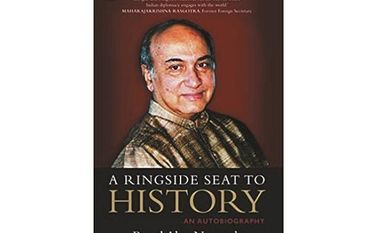A Ringside Seat to History: An Autobiography
Author: Pascal Alan Nazareth
Publisher: Konark Publishers
Price: Rs 800
Pages: 280
India’s record of extraditing errant businessmen from overseas is one of failure or a pretence at pursuing. It doesn’t help that prison conditions in India are below par, that it has not ratified the UN convention against torture and injustices such as the ill-treatment of the Chennai Six (British ex-servicemen who spent two-and-a-half years in jail for a crime they didn’t commit) and Christian Michel, who is languishing behind bars for nearly two years without trial, continually surface.
Lalit Modi was charged by the Board for Control of Cricket in India for embezzling $80 million, following which the Manmohan Singh government sought his return from Britain. When Narendra Modi came to power, the late Sushma Swaraj, as external affairs minister, effectively scuttled the demand.
Vijay Mallya’s Kingfisher Airline went bankrupt and the Indian government secured a judicial order for his deportation; but mysteriously the trail has gone cold. Jewellers Nirav Modi and Mehul Choksi are accused of defrauding banks to the tune of billions of dollars. But a delay in Indian authorities lending co-operation to the United Kingdom’s Serious Fraud Office has prevented the former being sent back without the rigmarole of a court process. Choksi has taken cover under Antiguan citizenship.
Fifty-three years ago, though, Alan Nazareth, as an Indian consul in New York, was assigned to chase down an economic offender, Dharma Teja, who founded Jayanti Shipping Company with a $40 million loan from India’s Shipping Development Fund, but swindled his firm’s money before disappearing abroad. In his recently published autobiography A Ringside Seat to History, Ambassador Nazareth, now 84, recalls he was told to “make best efforts to locate him and have him arrested/deported to India”.
US immigration detained Teja and his wife for overstaying and produced them in court. The judge granted the couple bail, which they immediately exploited to escape to Costa Rica. Teja bribed a former president, Jose Figueres $30,000 to obtain the required visas.
Mr Nazareth dashed to San Jose to meet the incumbent president, who directed the Tejas to be expelled. But when the police arrived at the address where the duo were holed up, they slipped out of the backdoor to speed away in a sports car.
Teja, then, summoned a press conference, wherein he alleged he was being hounded because of envy back in India and sought political asylum. This succeeded in winning him sympathy from opposition political parties and the Costa Rican public, but failed to impress the president. So, the absconders conjured another trick. Mrs Teja became pregnant and duly delivered a son. That ensured they wouldn’t be extradited.
In 1970, the flashy Teja, armed with a Costa Rican diplomatic passport, travelled to London. Mr Nazareth, then charge d’affaires in Peru, was tipped off about the trip by a former secretary-general of the foreign ministry in San Jose. Teja protested vehemently when arrested at Heathrow airport. But the British foreign office responded, only diplomats accredited to the UK are entitled to diplomatic immunities. He was extradited to India. Mr Nazareth’s valiant three-year effort had borne fruit.
Mr Nazareth was, thereafter, posted to London where he became deputy high commissioner. Indeed, this gave him a ringside view of perhaps a far murkier matter. The Janata party was in power and Morarji Desai as prime minister visited in July 1978. “Among those who accompanied him was his son Kanti,” he recounts. “I witnessed with amazement the respectful attention senior British Defence Ministry officials paid him, and the separate huddles they had now and again with secretary to PM.” He continues: “In mid-October 1978, when I was AHC (acting high commissioner) again, I received a telephone call from PMO instructing me to convey to ‘Prime Minister (James) Callaghan personally’ that Government of India had decided to purchase the Jaguar fighter aircraft despite stiff competition from its rivals.” He promptly conveyed the message. The deal was worth $2.2 billion for 200 planes for the Indian Air Force. During Desai’s stewardship Kanti (who held no position in government) was perceived to be a wheeler-dealer. If anything, the eye-witness description of his odd pow-wows with the UK’s defence officials confirms the suspicion.
Mr Nazareth’s career coincided with the ascendance of economic diplomacy as a vital element of Indian foreign policy. In between two coup d’etats in Ghana — where he was now high commissioner — he pitched for Indian buses to the country’s ministry of transport, who complained their British and Germany vehicles were “unsuited for Ghana’s pot-holed roads”. Tata’s quote, which was almost one-third the European tenders, won the contract for 200 coaches.
Mr Nazareth’s career swansong was in Mexico, where he managed to instil India is not merely about the Vedas and the Taj Mahal, but a potential trade and investment partner. Narendra Modi’s emphasis on yoga diplomacy may, however, have restored the old concept!
In today’s superficial world of social media, books have sadly taken a backseat. Diplomacy — other than petty preoccupation with Pakistan — is a remote subject for even the bulk of Indian intelligentsia. But whether it’s proximity to the overthrow of Chilean president, Salvador Allende, by the CIA or a swimsuit-clad Indira Gandhi wading into the sea in Myanmar, those curious may encounter entertaining nuggets in a readable reminiscences of an IFS officer.













)
